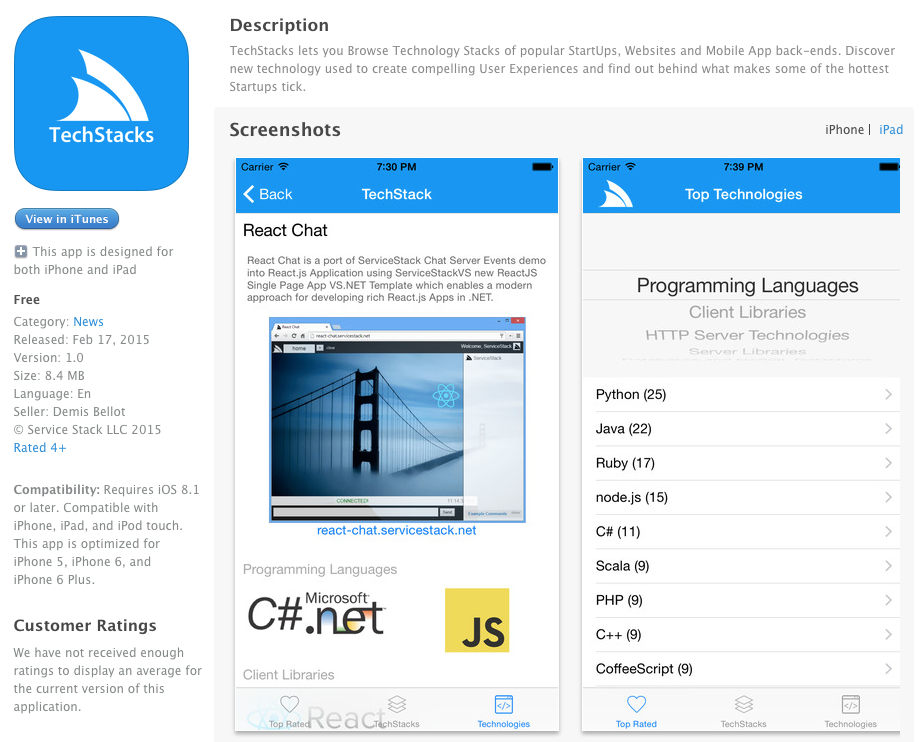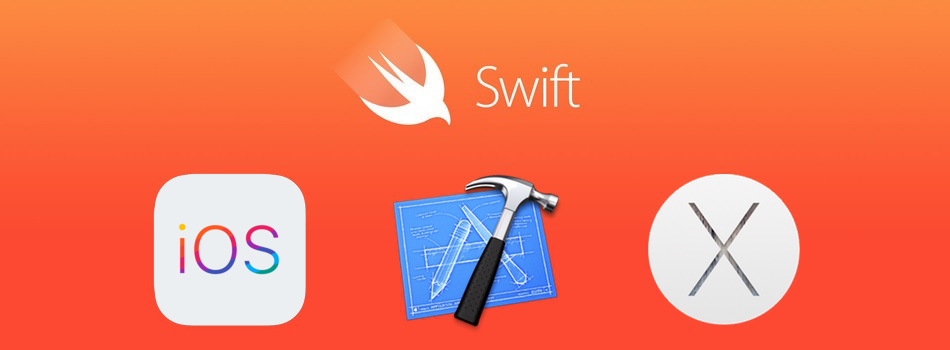
Swift
ServiceStack's Add ServiceStack Reference feature lets iOS/macOS developers easily generate an native
typed Swift API for your ServiceStack Services using the x dotnet command-line tool.
Simple command-line utils for ServiceStack
The x dotnet tool provides a simple command-line UX to easily Add and Update Swift ServiceStack References.
Prerequisites: Install .NET Core.
$ dotnet tool install --global x
This will make the x dotnet tool available in your $PATH which can now be used from within a Terminal window at your Xcode project folder.
Alternative (without .NET): npx get-dtos
Alternatively API consumers can use npx get-dtos to Add/Update ServiceStack References without needing .NET installed, where any command starting with:
x <lang>
Can be replaced with:
npx get-dtos <lang>
To instead Add / Update ServiceStack references using the npm get-dtos package.
Reference ServiceStack.Swift
To use the latest JsonServiceClient you'll need to add a reference to ServiceStack Swift library using your preferred package manager:
Xcode
From Xcode 12 the Swift Package Manager is built into Xcode.
Go to File > Swift Packages > Add Package Dependency:
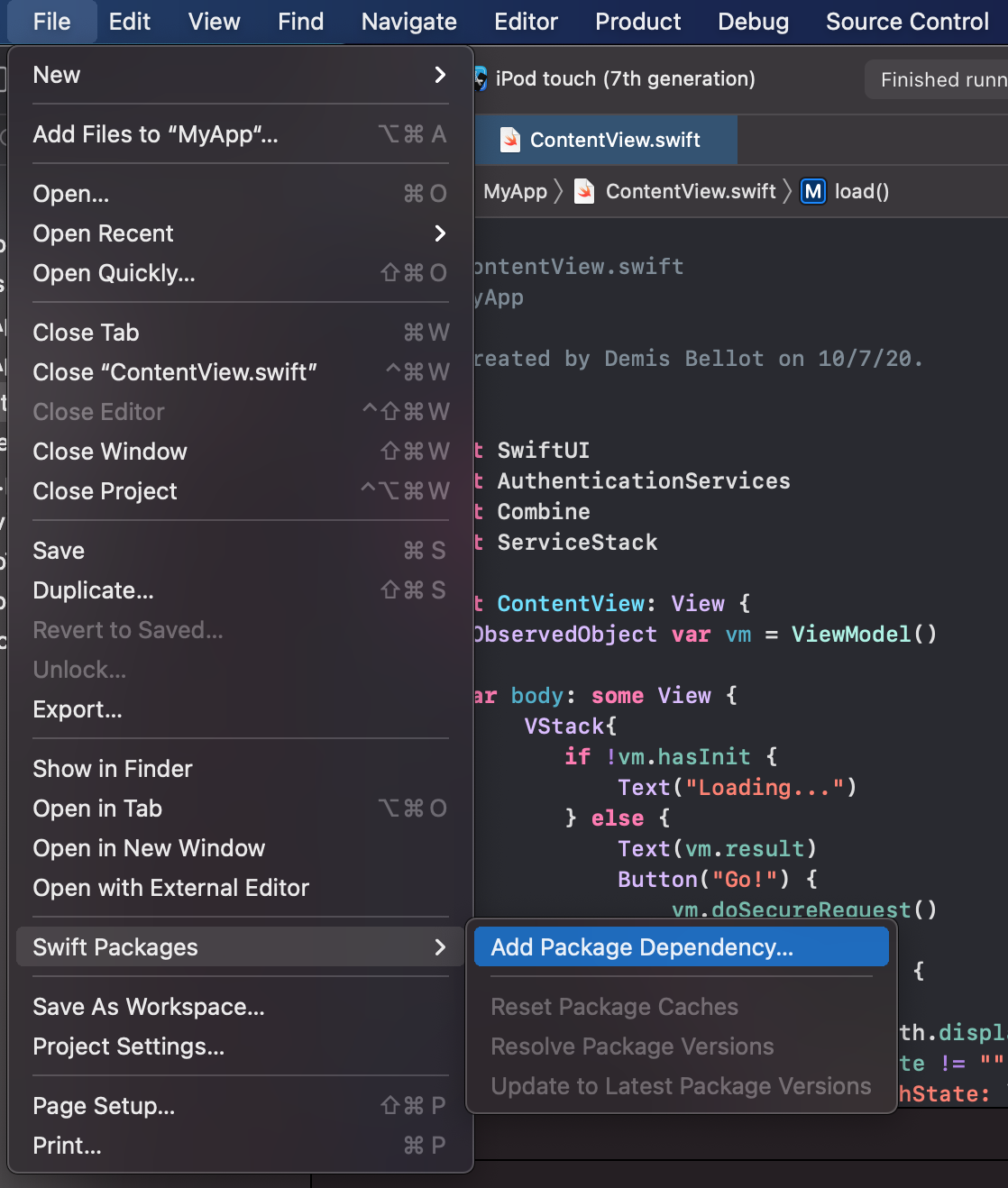
Add a reference to the ServiceStack.Swift GitHub repo:
https://github.com/ServiceStack/ServiceStack.Swift
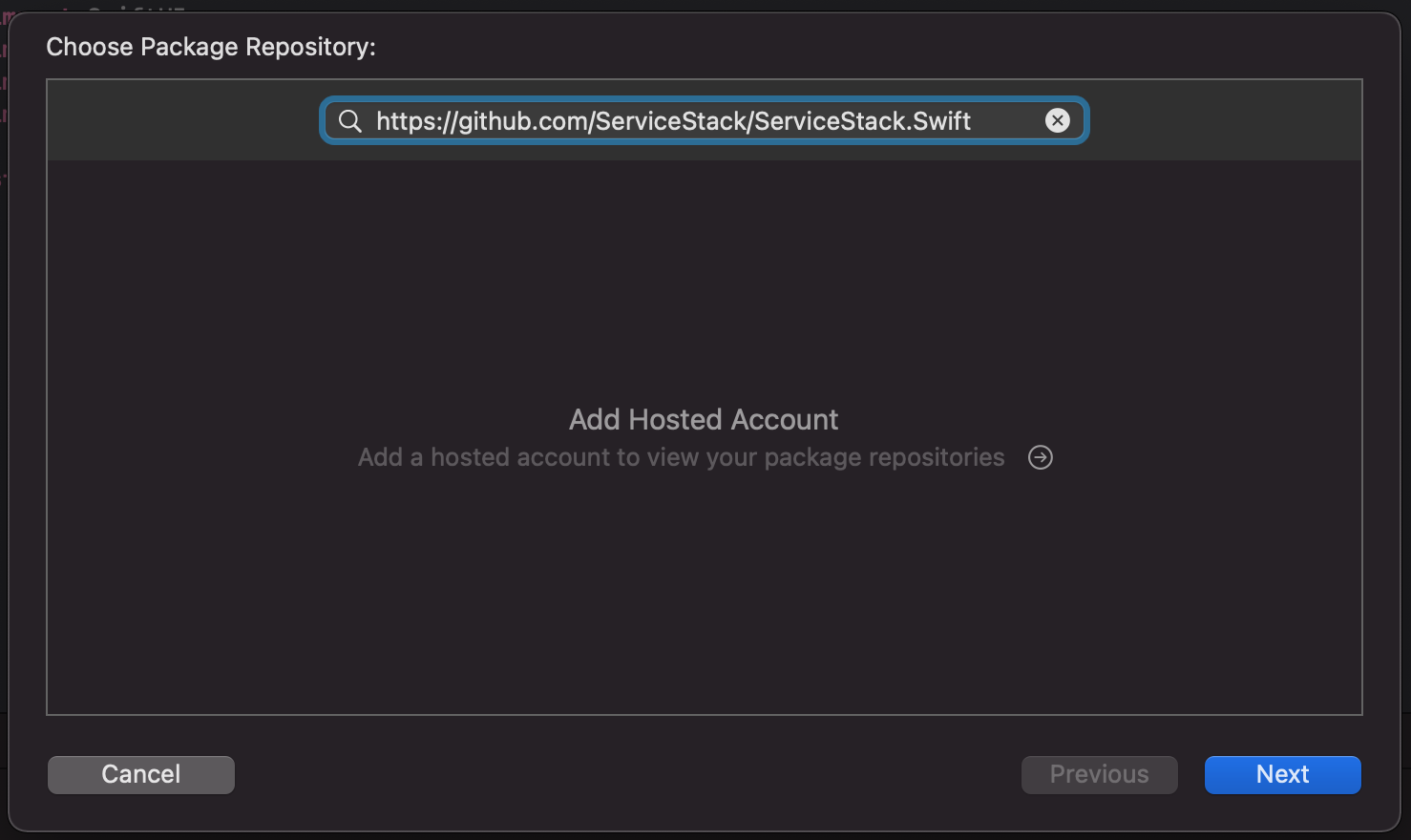
After adding the dependency ServiceStack.Swift will be added to your project:
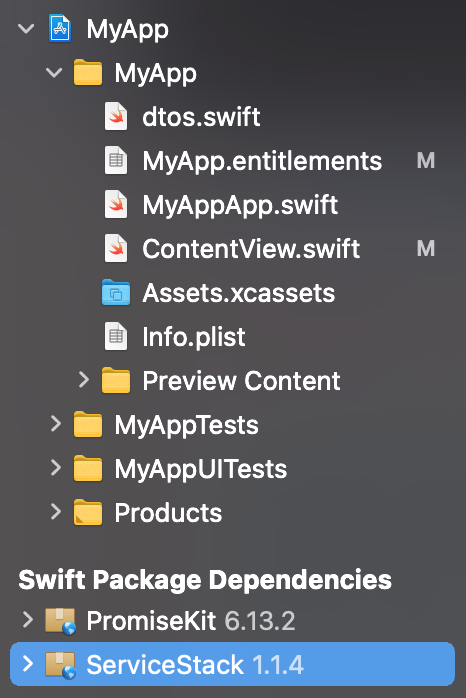
CocoaPods
In your Podfile:
use_frameworks!
# Pods for Project
pod "ServiceStack", '~> 6.0.5'
SwiftPM
dependencies: [
.package(url: "https://github.com/ServiceStack/ServiceStack.Swift.git", from: "6.0.5")
],
Simple Usage Example
Async usage example:
import ServiceStack
let response = try await client.getAsync(AppOverview())
print(response.topTechnologies.count) //= 100
Sync usage example:
import ServiceStack
let client = JsonServiceClient(baseUrl: "https://techstacks.io")
let response = client.get(AppOverview())
Add a new ServiceStack Reference
To Add a new ServiceStack Reference, call x swift with the Base URL to a remote ServiceStack instance:
$ x swift {BaseUrl}
$ x swift {BaseUrl} {FileName}
Where if no FileName is provided, it's inferred from the host name of the remote URL, e.g:
$ x swift https://techstacks.io
Downloads the Typed Swift DTOs for techstacks.io and saves them to dtos.swift.
Alternatively you can have it saved to a different FileName with:
$ x swift https://techstacks.io TechStacks
Which instead saves the DTOs to dtos.swift.
x swift also downloads ServiceStack's Swift Client
and saves it to JsonServiceClient.swift which together with the Server DTOs contains all the dependencies
required to consume Typed Web Services in Swift.
Update an existing ServiceStack Reference
The easiest way to update all your Swift Server DTOs is to just call x swift without any arguments:
$ x swift
This will go through and update all your *.dtos.swift Service References.
To Update a specific ServiceStack Reference, call x swift with the Filename:
$ x swift {FileName.dtos.swift}
As an example, you can Update the Server DTOs added in the previous command with:
$ x swift dtos.swift
Which also includes any Customization Options that were manually added.
Swift Server Configuration
The Swift defaults are overridable on the ServiceStack Server by modifying the default config on the
NativeTypesFeature Plugin, e.g:
var typesConfig = this.GetPlugin<NativeTypesFeature>().MetadataTypesConfig;
typesConfig.AddResponseStatus = true;
More Swift-specific configuration is available on the SwiftGenerator class itself, e.g:
SwiftGenerator.DefaultImports.Add("UIKit");
Swift Configuration
The header comments in the generated DTO's allows for further customization of how the DTO's are generated which can then be updated with any custom Options provided using the Update ServiceStack Reference Menu Item in XCode. Options that are preceded by a Swift single line comment // are defaults from the server that can be overridden, e.g:
/* Options:
Date: 2025-06-04 09:51:09
SwiftVersion: 6.0
Version: 8.80
Tip: To override a DTO option, remove "//" prefix before updating
BaseUrl: https://blazor-vue.web-templates.io
//BaseClass:
//AddModelExtensions: True
//AddServiceStackTypes: True
//MakePropertiesOptional: True
//IncludeTypes:
//ExcludeTypes:
//ExcludeGenericBaseTypes: False
//AddResponseStatus: False
//AddImplicitVersion:
//AddDescriptionAsComments: True
//InitializeCollections: False
//TreatTypesAsStrings:
//DefaultImports: Foundation,ServiceStack
*/
To override a value, remove the // and specify the value to the right of the :. Any value uncommented will be sent to the server to override any server defaults.
We'll go through and cover each of the above options to see how they affect the generated DTO's:
BaseClass
Specify a base class that's inherited by all Swift DTO's, e.g. to enable Key-Value Observing (KVO) in the generated DTO models have all types inherit from NSObject:
/* Options:
BaseClass: NSObject
Will change all DTO types to inherit from NSObject:
public class UserInfo : NSObject { ... }
AddModelExtensions
Remove the the code-generated type extensions required to support typed JSON serialization of the Swift types and leave only the clean Swift DTO Type definitions.
/* Options:
AddModelExtensions: False
AddServiceStackTypes
Don't generate the types for built-in ServiceStack classes and Services like ResponseStatus and Authenticate, etc.
/* Options:
AddServiceStackTypes: False
IncludeTypes
Is used as a Whitelist that can be used to specify only the types you would like to have code-generated:
/* Options:
IncludeTypes: GetTechnology,GetTechnologyResponse
Will only generate GetTechnology and GetTechnologyResponse DTO's:
public class GetTechnology { ... }
public class GetTechnologyResponse { ... }
Include Request DTO and its dependent types
You can include a Request DTO and all its dependent types with a .* suffix on the Request DTO, e.g:
/* Options:
IncludeTypes: GetTechnology.*
Which will include the GetTechnology Request DTO, the GetTechnologyResponse Response DTO and all Types that they both reference.
Include All Types within a C# namespace
If your DTOs are grouped into different namespaces they can be all included using the /* suffix, e.g:
/* Options:
IncludeTypes: MyApp.ServiceModel.Admin/*
This will include all DTOs within the MyApp.ServiceModel.Admin C# namespace.
Include All Services in a Tag Group
Services grouped by Tag can be used in the IncludeTypes where tags can be specified using braces in the format {tag} or {tag1,tag2,tag3}, e.g:
/* Options:
IncludeTypes: {web,mobile}
Or individually:
/* Options:
IncludeTypes: {web},{mobile}
ExcludeTypes
Is used as a Blacklist where you can specify which types you would like to exclude from being generated:
/* Options:
ExcludeTypes: GetTechnology,GetTechnologyResponse
Will exclude GetTechnology and GetTechnologyResponse DTO's from being generated.
ExcludeGenericBaseTypes
Work around a regression added in Swift 1.2 where the Swift compiler segfaults trying to compile Extensions to Types with a Generic Base Class. You can omit the problematic Generic Base Types from being generated with:
ExcludeGenericBaseTypes: True
Any types that were omitted from the generated DTO's will be emitted in comments, using the format:
//Excluded: {TypeName}
AddResponseStatus
Automatically add a ResponseStatus property on all Response DTO's, regardless if it wasn't already defined:
/* Options:
AddResponseStatus: True
Will add a ResponseStatus property to all Response DTO's:
public class GetAllTechnologiesResponse
{
...
public var responseStatus:ResponseStatus
}
AddImplicitVersion
Lets you specify the Version number to be automatically populated in all Request DTO's sent from the client:
/* Options:
AddImplicitVersion: 1
Will add an initialized version property to all Request DTO's:
public class GetAllTechnologies : IReturn
{
...
public var version:Int = 1
}
This lets you know what Version of the Service Contract that existing clients are using making it easy to implement ServiceStack's recommended versioning strategy.
InitializeCollections
Whether enumerables should be initialized with an empty collection (default) or changed to use an Optional type:
/* Options:
InitializeCollections: False
Changes Collection Definitions to be declared as Optional Types instead of being initialized with an empty collection:
public class ResponseStatus
{
public var errors:[ResponseError]?
}
DefaultImports
Add additional import statements to the generated DTO's:
/* Options:
DefaultImports: UIKit,Foundation
Will import the UIKit and Foundation frameworks:
import UIKit;
import Foundation;
Swift style enums
You can override code-generation to emit Swift Style camelCase enums in your AppHost with:
SwiftGenerator.EnumNameStrategy = SwiftGenerator.SwiftStyleEnums;
Swift Client Usage
JsonServiceClient.swift
The same ideal, high-level API available in .NET's ServiceClients have been translated into idiomatic Swift as seen with its ServiceClient protocol definition below:
public protocol ServiceClient {
func get<T: IReturn>(_ request: T) throws -> T.Return where T: Codable
func get<T: IReturnVoid>(_ request: T) throws -> Void where T: Codable
func get<T: IReturn>(_ request: T, query: [String: String]) throws -> T.Return where T: Codable
func get<T: Codable>(_ relativeUrl: String) throws -> T
func getAsync<T: IReturn>(_ request: T) async throws -> T.Return where T: Codable
func getAsync<T: IReturnVoid>(_ request: T) async throws -> Void where T: Codable
func getAsync<T: IReturn>(_ request: T, query: [String: String]) async throws -> T.Return where T: Codable
func getAsync<T: Codable>(_ relativeUrl: String) async throws -> T
func post<T: IReturn>(_ request: T) throws -> T.Return where T: Codable
func post<T: IReturnVoid>(_ request: T) throws -> Void where T: Codable
func post<Response: Codable, Request: Codable>(_ relativeUrl: String, request: Request?) throws -> Response
func postAsync<T: IReturn>(_ request: T) async throws -> T.Return where T: Codable
func postAsync<T: IReturnVoid>(_ request: T) async throws -> Void where T: Codable
func postAsync<Response: Codable, Request: Codable>(_ relativeUrl: String, request: Request?) async throws -> Response
func put<T: IReturn>(_ request: T) throws -> T.Return where T: Codable
func put<T: IReturnVoid>(_ request: T) throws -> Void where T: Codable
func put<Response: Codable, Request: Codable>(_ relativeUrl: String, request: Request?) throws -> Response
func putAsync<T: IReturn>(_ request: T) async throws -> T.Return where T: Codable
func putAsync<T: IReturnVoid>(_ request: T) async throws -> Void where T: Codable
func putAsync<Response: Codable, Request: Codable>(_ relativeUrl: String, request: Request?) async throws -> Response
func delete<T: IReturn>(_ request: T) throws -> T.Return where T: Codable
func delete<T: IReturnVoid>(_ request: T) throws -> Void where T: Codable
func delete<T: IReturn>(_ request: T, query: [String: String]) throws -> T.Return where T: Codable
func delete<T: Codable>(_ relativeUrl: String) throws -> T
func deleteAsync<T: IReturn>(_ request: T) async throws -> T.Return where T: Codable
func deleteAsync<T: IReturnVoid>(_ request: T) async throws -> Void where T: Codable
func deleteAsync<T: IReturn>(_ request: T, query: [String: String]) async throws -> T.Return where T: Codable
func deleteAsync<T: Codable>(_ relativeUrl: String) async throws -> T
func patch<T: IReturn>(_ request: T) throws -> T.Return where T: Codable
func patch<T: IReturnVoid>(_ request: T) throws -> Void where T: Codable
func patch<Response: Codable, Request: Codable>(_ relativeUrl: String, request: Request?) throws -> Response
func patchAsync<T: IReturn>(_ request: T) async throws -> T.Return where T: Codable
func patchAsync<T: IReturnVoid>(_ request: T) async throws -> Void where T: Codable
func patchAsync<Response: Codable, Request: Codable>(_ relativeUrl: String, request: Request?) async throws -> Response
func send<T: IReturn>(_ request: T) throws -> T.Return where T: Codable
func send<T: IReturnVoid>(_ request: T) throws -> Void where T: Codable
func send<T: Codable>(intoResponse: T, request: URLRequest) throws -> T
func sendAsync<T: Codable>(intoResponse: T, request: URLRequest) async throws -> T
func postFileWithRequest<T: IReturn & Codable>(request:T, file:UploadFile) throws -> T.Return
func postFileWithRequestAsync<T: IReturn & Codable>(request:T, file:UploadFile) async throws -> T.Return
func postFileWithRequest<T: IReturn>(_ relativeUrl: String, request:T, fileName:String, data:Data, mimeType:String?, fieldName:String?) throws -> T.Return
func postFileWithRequestAsync<T: IReturn>(_ relativeUrl: String, request:T, fileName:String, data:Data, mimeType:String?, fieldName:String?) async throws -> T.Return
func postFileWithRequest<T: IReturn>(url:URL, request:T, fileName:String, data:Data, mimeType:String?, fieldName:String?) throws -> T.Return
func postFileWithRequestAsync<T: IReturn>(url:URL, request:T, fileName:String, data:Data, mimeType:String?, fieldName:String?) async throws -> T.Return
func postFilesWithRequest<T: IReturn & Codable>(request:T, files:[UploadFile]) throws -> T.Return
func postFilesWithRequestAsync<T: IReturn & Codable>(request:T, files:[UploadFile]) async throws -> T.Return
func postFilesWithRequest<T: IReturn>(url:URL, request:T, files:[UploadFile]) throws -> T.Return
func postFilesWithRequestAsync<T: IReturn>(url:URL, request:T, files:[UploadFile]) async throws -> T.Return
func putFileWithRequest<T: IReturn & Codable>(request:T, file:UploadFile) throws -> T.Return
func putFileWithRequestAsync<T: IReturn & Codable>(request:T, file:UploadFile) async throws -> T.Return
func putFileWithRequest<T: IReturn>(_ relativeUrl: String, request:T, fileName:String, data:Data, mimeType:String?, fieldName:String?) throws -> T.Return
func putFileWithRequestAsync<T: IReturn>(_ relativeUrl: String, request:T, fileName:String, data:Data, mimeType:String?, fieldName:String?) async throws -> T.Return
func putFileWithRequest<T: IReturn>(url:URL, request:T, fileName:String, data:Data, mimeType:String?, fieldName:String?) throws -> T.Return
func putFileWithRequestAsync<T: IReturn>(url:URL, request:T, fileName:String, data:Data, mimeType:String?, fieldName:String?) async throws -> T.Return
func putFilesWithRequest<T: IReturn & Codable>(request:T, files:[UploadFile]) throws -> T.Return
func putFilesWithRequestAsync<T: IReturn & Codable>(request:T, files:[UploadFile]) async throws -> T.Return
func putFilesWithRequest<T: IReturn>(url:URL, request:T, files:[UploadFile]) throws -> T.Return
func putFilesWithRequestAsync<T: IReturn>(url:URL, request:T, files:[UploadFile]) async throws -> T.Return
func sendFileWithRequest<T: IReturn>(_ req:inout URLRequest, request:T, fileName:String, data:Data, mimeType:String?, fieldName:String?) throws -> T.Return
func sendFileWithRequestAsync<T: IReturn>(_ req:inout URLRequest, request:T, fileName:String, data:Data, mimeType:String?, fieldName:String?) async throws -> T.Return
func sendFilesWithRequest<T: IReturn>(_ req:inout URLRequest, request:T, files:[UploadFile]) throws -> T.Return
func sendFilesWithRequestAsync<T: IReturn>(_ req:inout URLRequest, request:T, files:[UploadFile]) async throws -> T.Return
func getData(url: String) throws -> (Data, HTTPURLResponse)?
func getDataAsync(url: String) async throws -> (Data, HTTPURLResponse)?
func getData(request: URLRequest, retryIf:((HTTPURLResponse) -> Bool)?) throws -> (Data, HTTPURLResponse)?
func getDataAsync(request: URLRequest, retryIf:((HTTPURLResponse) async throws -> Bool)?) async throws -> (Data, HTTPURLResponse)?
func getCookies() -> [String:String]
func getTokenCookie() -> String?
func getRefreshTokenCookie() -> String?
}
Generic type constraints omitted for readability
The minor differences are primarily due to differences in Swift which instead of throwing Exceptions uses error codes and Optional return types and its lack of any asynchrony language support led us to embed a lightweight and well-documented Promises implementation in PromiseKit which closely matches the Task<T> type used in .NET Async API's.
JsonServiceClient Usage
If you've ever had to make HTTP requests using Objective-C's NSURLConnection or NSURLSession static classes in iOS or macOS, you'll appreciate the typing benefits and productivity offered by the higher-level API's in JsonServiceClient - which enable the same ideal client API's we've enjoyed in ServiceStack's .NET Clients, in Swift Apps!
Tip
A nice benefit of using JsonServiceClient over static classes is that Service calls can be easily substituted and mocked with the above ServiceClient protocol, making it easy to test or stub out the external Gateway calls whilst the back-end is under development.
To illustrate its usage we'll go through some client code to consume TechStacks Services after adding a ServiceStack Reference to http://techstaks.io:
var client = JsonServiceClient(baseUrl: "https://techstacks.io")
var response = client.get(AppOverview())
Essentially usage is the same as it is in .NET ServiceClients - where it just needs the baseUrl of the remote ServiceStack instance, which can then be used to consume remote Services by sending typed Request DTO's that respond in kind with the expected Response DTO.
Async API Usage
Whilst the sync API's are easy to use their usage should be limited in background threads so they're not blocking the Apps UI whilst waiting for responses. Most of the time when calling services from the Main UI thread you'll want to use the non-blocking async API's, which for the same API looks like:
let response = try await client.getAsync(AppOverview())
Inspect.printDump(response)
Swift also lets you continue marking it up with explicit Type Information and optional syntax as preferred, e.g:
let response:AppOverviewResponse = try await client.getAsync(AppOverview())
Inspect.printDump(response)
Which is very similar to how we'd make async Task<T> calls in C# when not using its async/await language syntax sugar.
INFO
Async callbacks are called back on the main thread, ideal for use in iOS Apps. This behavior is also configurable in the Promise's callback API.
Typed Error Handling
As Swift doesn't provide try/catch Exception Handling, Error handling is a little different in Swift which for most failable API's just returns a nil Optional to indicate when the operation didn't succeed. When more information about the error is required, API's will typically accept an additional NSError pointer argument to populate with more information about the error. Any additional metadata can be attached to NSError's userInfo Dictionary. We also follow this same approach to provide our structured error handling in JsonServiceClient.
To illustrate exception handling we'll connect to ServiceStack's Test Services and call the ThrowType Service to intentionally throw the error specified, e.g:
Sync Error Handling
Handling a Single C# Exception:
var client = JsonServiceClient(baseUrl: "https://test.servicestack.net")
var request = ThrowType()
request.type = "NotFound"
request.message = "custom message"
do {
let response = client.post(request)
} catch var error as NSError {
error.code //= 404
//Convert into typed ResponseStatus
var status:ResponseStatus = error.convertUserInfo()
status.message //= not here
status.stackTrace //= Server Stack Trace
}
Handling a Validation Exception with multiple field validation errors:
let client = JsonServiceClient(baseUrl: "https://test.servicestack.net")
let request = ThrowValidation()
request.email = "invalidemail"
do {
let response = try client.post(request)
} catch let responseError as NSError {
let status:ResponseStatus = responseError.convertUserInfo()!
status.errors.count //= 3
let field1 = status.errors[0]
field1.errorCode! //= InclusiveBetween
field1.fieldName! //= Age
field1.message! //= 'Age' must be between 1 and 120. You entered 0.
}
Async Error Handling
To handle errors in Async API's we just add a callback on .error() API on the returned Promise, e.g:
let request = ThrowValidation()
request.email = "invalidemail"
do {
_ = try await client.postAsync(request)
} catch let responseError as NSError {
let status:ResponseStatus = responseError.convertUserInfo()!
status.errors.count //= 3
let field1 = status.errors[0]
field1.errorCode! //= InclusiveBetween
field1.fieldName! //= Age
field1.message! //= 'Age' must be between 1 and 120. You entered 0.
}
JsonServiceClient Error Handlers
Just like in .NET, we can also attach Global or instance error handlers to be able to generically handle all Service Client errors with a custom handler, e.g:
client.onError = {(e:NSError) in ... }
JsonServiceClient.Global.onError = {(e:NSError) in ... }
Swift HTTP Marker Interfaces
The new send* API's take advantage of the HTTP Verb Interface Markers described below to send the Request DTO using the
annotated HTTP Method, e.g:
public class HelloByGet : IReturn, IGet
{
public typealias Return = HelloResponse
public var name:String?
}
public class HelloByPut : IReturn, IPut
{
public typealias Return = HelloResponse
public var name:String?
}
let response = try client.send(HelloByGet()) //GET
client.sendAsync(HelloByPut()) //PUT
.done { }
Custom Routes
As Swift doesn't support Attributes any exported .NET Attributes are emitted in comments on the Request DTO they apply to, e.g:
// @Route("/technology/{Slug}")
public class GetTechnology : IReturn { ... }
This also means that the Custom Routes aren't used when making Service Requests and instead just uses ServiceStack's built-in pre-defined routes.
But when preferred JsonServiceClient can also be used to call Services using Custom Routes, e.g:
var response:GetTechnologyResponse? = client.get("/technology/servicestack")
INFO
the explicit type definition on the return type is required here as Swift uses it as part of the generic method invocation.
Uploading Files
The postFileWithRequestAsync method can be used to upload a file with an API Request.
For example you can request a Speech to Text
transcription by sending an audio file to the SpeechToText API using the new postFilesWithRequest method:
Calling AI Server to transcribe an Audio Recording
let client = JsonServiceClient(baseUrl: "https://openai.servicestack.net")
client.bearerToken = apiKey
let request = SpeechToText()
request.refId = "uniqueUserIdForRequest"
let response = try client.postFilesWithRequest(request:request,
file:UploadFile(fileName:"audio.mp3", data:mp3Data, fieldName:"audio"))
Inspect.printDump(response)
Async Upload Files with API Example
Alternatively use the new postFileWithRequestAsync method to call the API asynchronously
using Swift 6 Concurrency
new async/await feature:
let response = try await client.postFileWithRequestAsync(request:request,
file:UploadFile(fileName:"audio.mp3", data:mp3Data, fieldName:"audio"))
Inspect.printDump(response)
Multiple file upload with API Request examples
Whilst the postFilesWithRequest methods can be used to upload multiple files with an API Request. e.g:
let request = WatermarkVideo()
request.position = .BottomRight
let response = try client.postFilesWithRequest(request: request,
files: [
UploadFile(fileName: "video.mp4", data:videoData, fieldName:"video"),
UploadFile(fileName: "watermark.jpg", data:watermarkData, fieldName:"watermark")
])
Async Example:
let response = try await client.postFilesWithRequestAsync(request: request,
files: [
UploadFile(fileName: "video.mp4", data:videoData, fieldName:"video"),
UploadFile(fileName: "watermark.jpg", data:watermarkData, fieldName:"watermark")
])
JsonServiceClient Options
Other options that can be configured on JsonServiceClient include:
client.onError = {(e:NSError) in ... }
client.timeout = ...
client.cachePolicy = NSURLRequestCachePolicy.ReloadIgnoringLocalCacheData
client.requestFilter = {(req:URLRequest) in ... }
client.responseFilter = {(res:URLResponse) in ... }
//static Global configuration
JsonServiceClient.Global.onError = {(e:NSError) in ... }
JsonServiceClient.Global.requestFilter = {(req:URLRequest) in ... }
JsonServiceClient.Global.responseFilter = {(res:URLResponse) in ... }
TechStacks iOS App
To illustrate the ease-of-use and utility of ServiceStack's new Swift support you can checkout the TechStacks native iOS App for techstacks.io that has been recently published and is now available to download for free on the AppStore:
The complete source code for the TechStacks App is available on GitHub - providing a good example on how easy it is to take advantage of ServiceStack's Swift support to quickly build a rich and responsive Services-heavy native iOS App.
All remote Service Calls used by the App are encapsulated into a single AppData.swift class and only uses JsonServiceClient's non-blocking Async API's to ensure a Responsive UI is maintained throughout the App.
MVC and Key-Value Observables (KVO)
If you've ever had to implement INotifyPropertyChanged in .NET, you'll find the built-in model binding capabilities in iOS/macOS a refreshing alternative thanks to Objective-C's underlying NSObject which automatically generates change notifications for its KV-compliant properties. UIKit and Cocoa frameworks both leverage this feature to enable its Model-View-Controller Pattern.
As keeping UI's updated with Async API callbacks can get unwieldy, we wanted to go through how we're taking advantage of NSObject's KVO support in Service Responses to simplify maintaining dynamic UI's.
Enable Key-Value Observing in Swift DTO's
Firstly to enable KVO in your Swift DTO's we'll want to have each DTO inherit from NSObject which can be done by uncommenting BaseObject option in the header comments as seen below:
/* Options:
Date: 2015-02-19 22:43:04
Version: 1
BaseUrl: https://techstacks.io
BaseClass: NSObject
...
*/
and click the Update ServiceStack Reference Menu Option to fetch the updated DTO's.
Then to enable Key-Value Observing just mark the response DTO variables with the dynamic modifier, e.g:
public dynamic var allTiers:[Option] = []
public dynamic var overview:AppOverviewResponse = AppOverviewResponse()
public dynamic var topTechnologies:[TechnologyInfo] = []
public dynamic var allTechnologies:[Technology] = []
public dynamic var allTechnologyStacks:[TechnologyStack] = []
Which is all that's needed to allow properties to be observed as they'll automatically issue change notifications when they're populated in the Service response async callbacks, e.g:
func loadOverview() -> Promise<AppOverviewResponse> {
return client.getAsync(AppOverview())
.done { r in
self.overview = r
self.allTiers = r.allTiers
self.topTechnologies = r.topTechnologies
return r
}
}
func loadAllTechnologies() -> Promise<GetAllTechnologiesResponse> {
return client.getAsync(GetAllTechnologies())
.done { r in
self.allTechnologies = r.results
return r
}
}
func loadAllTechStacks() -> Promise<GetAllTechnologyStacksResponse> {
return client.getAsync(GetAllTechnologyStacks())
.done { r in
self.allTechnologyStacks = r.results
return r
}
}
Observing Data Changes
In your ViewController have the datasources for your custom views binded to the desired data (which will initially be empty):
func pickerView(pickerView: UIPickerView, numberOfRowsInComponent component: Int) -> Int {
return appData.allTiers.count
}
...
func tableView(tableView: UITableView, numberOfRowsInSection section: Int) -> Int {
return appData.topTechnologies.count
}
Then in viewDidLoad() start observing the properties your UI Controls are bound to, e.g:
override func viewDidLoad() {
...
self.appData.observe(self, properties: ["topTechnologies", "allTiers"])
self.appData.loadOverview()
}
deinit { self.appData.unobserve(self) }
In the example code above we're using some custom KVO helpers to keep the code required to a minimum.
With the observable bindings in place, the change notifications of your observed properties can be handled by overriding observeValueForKeyPath() which passes the name of the property that's changed in the keyPath argument that can be used to determine the UI Controls to refresh, e.g:
override func observeValueForKeyPath(keyPath:String, ofObject object:AnyObject, change:[NSObject:AnyObject],
context: UnsafeMutablePointer<Void>) {
switch keyPath {
case "allTiers":
self.technologyPicker.reloadAllComponents()
case "topTechnologies":
self.tblView.reloadData()
default: break
}
}
Now that everything's configured, the observables provide an alternative to manually updating UI elements within async callbacks, instead you can now fire-and-forget your async API's and rely on the pre-configured bindings to automatically update the appropriate UI Controls when their bounded properties are updated, e.g:
self.appData.loadOverview() //Ignore response and use configured KVO Bindings
Images and Custom Binary Requests
In addition to greatly simplifying Web Service Requests, JsonServiceClient also makes it easy to fetch any custom HTTP response like Images and other Binary data using the generic getData() and getDataAsync() NSData API's. This is used in TechStacks to maintain a cache of all loaded images, reducing number of HTTP requests and load times when navigating between screens:
var imageCache:[String:UIImage] = [:]
public func loadImageAsync(url:String) -> Promise<UIImage?> {
if let image = imageCache[url] {
return Promise<UIImage?> { (complete, reject) in complete(image) }
}
return client.getDataAsync(url)
.done { (data:NSData) -> UIImage? in
if let image = UIImage(data:data) {
self.imageCache[url] = image
return image
}
return nil
}
}
TechStacks macOS Desktop App
As JsonServiceClient.swift has no external dependencies and only relies on core Foundation classes it
can be used anywhere Swift can including macOS Cocoa Desktop and Command Line Apps and Frameworks.
Most of the API's used in TechStacks iOS App are standard typed Web Services calls. There is also a TechStacks macOS Desktop available which showcases how easy it is to call ServiceStack's dynamic AutoQuery Services and how much auto-querying functionality they can provide for free.
E.g. The TechStacks Desktop app is essentially powered with these 2 AutoQuery Services:
[Query(QueryTerm.Or)] //change from filtering (default) to combinatory semantics
public class FindTechStacks : QueryBase<TechnologyStack> {}
[Query(QueryTerm.Or)]
public class FindTechnologies : QueryBase<Technology> {}
Basically just a Request DTO telling AutoQuery what Table we want to Query and that we want to change the default Search behavior to have OR semantics. We don't need to specify which properties we can query as the implicit conventions automatically infer it from the table being queried.
The TechStacks Desktop UI is then built around these 2 AutoQuery Services allowing querying against each field and utilizing a subset of the implicit conventions supported:
Querying Technology Stacks
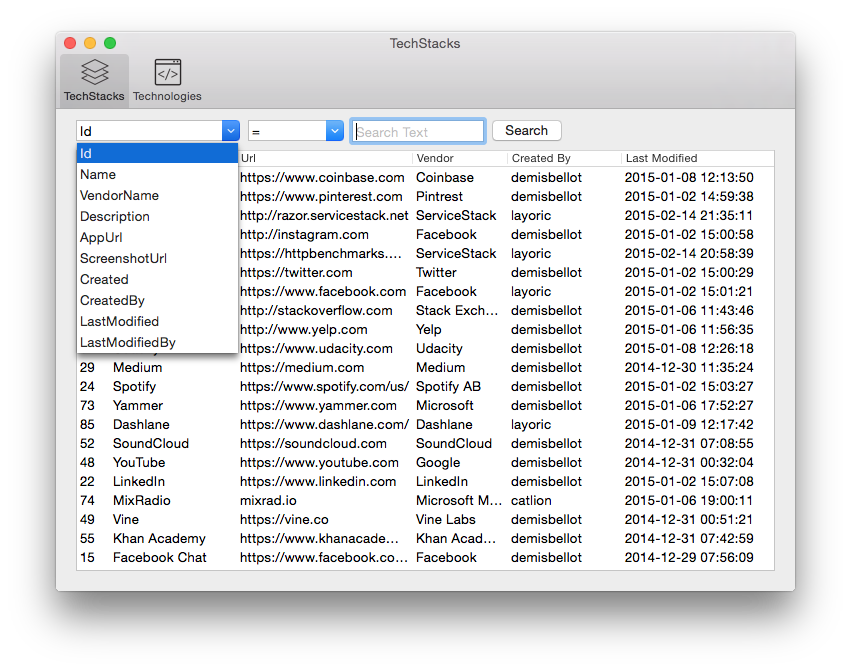
Querying Technologies
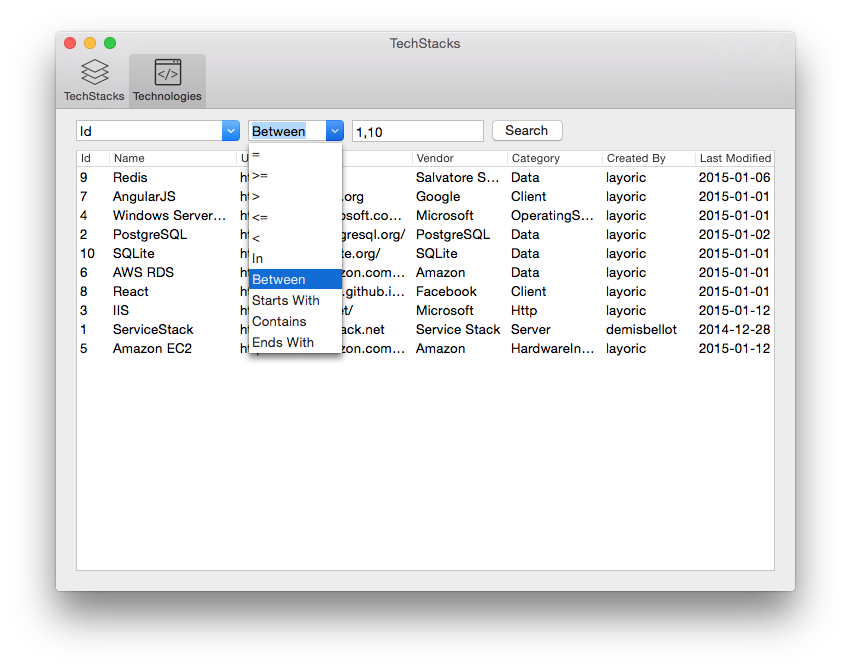
Like the TechStacks iOS App all Service Calls are maintained in a single AppData.swift class and uses KVO bindings to update its UI which is populated from these 2 services below:
func searchTechStacks(query:String, field:String? = nil, operand:String? = nil)
-> Promise<QueryResponse<TechnologyStack>> {
self.search = query
let queryString = query.count > 0 && field != nil && operand != nil
? [createAutoQueryParam(field!, operand!): query]
: ["NameContains":query, "DescriptionContains":query]
let request = FindTechStacks<TechnologyStack>()
return client.getAsync(request, query:queryString)
.done { (r:QueryResponse<TechnologyStack>) -> QueryResponse<TechnologyStack> in
self.filteredTechStacks = r.results
return r
}
}
func searchTechnologies(query:String, field:String? = nil, operand:String? = nil)
-> Promise<QueryResponse<Technology>> {
self.search = query
let queryString = query.count > 0 && field != nil && operand != nil
? [createAutoQueryParam(field!, operand!): query]
: ["NameContains":query, "DescriptionContains":query]
let request = FindTechnologies<Technology>()
return client.getAsync(request, query:queryString)
.done { (r:QueryResponse<Technology>) -> QueryResponse<Technology> in
self.filteredTechnologies = r.results
return r
}
}
func createAutoQueryParam(field:String, _ operand:String) -> String {
let template = autoQueryOperandsMap[operand]!
let mergedField = template.replace("%", withString:field)
return mergedField
}
Essentially employing the same strategy for both AutoQuery Services where it builds a query String parameter to send with the request. For incomplete queries, the default search queries both NameContains and DescriptionContains field conventions returning results where the Search Text is either in Name OR Description fields.
TechStacks Console App
In its quest to become a popular mainstream language, Swift includes a built-in Package Manager to simplify the maintenance, distribution and building of Swift code. Swift Package Manager can be used to build native statically-linked modules or Console Apps but currently has no support for iOS, watchOS, or tvOS platforms.
Nevertheless it's simple console and text-based programming model provides a great way to quickly develop prototypes or Console-based Swift Apps like swiftref using your favorite text editor. To support this environment we've packaged ServiceStack's Swift Service clients into a ServiceStackClient package so it can be easily referenced in Swift PM projects.
Together with Swift Add ServiceStack Reference we now have a productive development workflow for building statically-linked native executables that consume Typed ServiceStack Services as seen in the new step-by-step guide below showing how to create a simple Swift TechStacks Console App.
Swift Generated DTO Types
With Swift support our goal was to ensure a high-fidelity, idiomatic translation within the constraints of Swift language and built-in libraries, where the .NET Server DTO's are translated into clean Swift POSO's (Plain Old Swift Objects :) having their .NET built-in types mapped to their equivalent Swift data type.
To see what this ended up looking like, we'll peel back behind the covers and look at a couple of the Generated Swift Test Models to see how they're translated in Swift:
public class AllTypes
{
required public init(){}
public var id:Int?
public var nullableId:Int?
public var byte:Int8?
public var short:Int16?
public var int:Int?
public var long:Int64?
public var uShort:UInt16?
public var uInt:UInt32?
public var uLong:UInt64?
public var float:Float?
public var double:Double?
public var decimal:Double?
public var string:String?
public var dateTime:NSDate?
public var timeSpan:NSTimeInterval?
public var dateTimeOffset:NSDate?
public var guid:String?
public var char:Character?
public var nullableDateTime:NSDate?
public var nullableTimeSpan:NSTimeInterval?
public var stringList:[String] = []
public var stringArray:[String] = []
public var stringMap:[String:String] = [:]
public var intStringMap:[Int:String] = [:]
public var subType:SubType?
}
public class AllCollectionTypes
{
required public init(){}
public var intArray:[Int] = []
public var intList:[Int] = []
public var stringArray:[String] = []
public var stringList:[String] = []
public var pocoArray:[Poco] = []
public var pocoList:[Poco] = []
public var pocoLookup:[String:[Poco]] = [:]
public var pocoLookupMap:[String:[String:Poco]] = [:]
}
public enum EnumType : Int
{
case Value1
case Value2
}
As seen above, properties are essentially mapped to their optimal Swift equivalent. As DTO's can be partially complete all properties are Optional except for enumerables which default to an empty collection - making them easier to work with and despite their semantic differences, .NET enums are translated into typed Swift enums.
Swift Code Generation
As we were already using code-gen to generate the Swift types we could extend it without impacting the Developer UX has been expanded to also include what's essentially an explicit Reflection API for each type with API's to support serializing to and from JSON. Thanks to Swift's rich support for extending types we were able to leverage its Type extensions so the implementation details could remain disconnected from the clean Swift type definitions allowing improved readability when inspecting the remote DTO schema's.
We can look at AllCollectionTypes to see an example of the code-gen that's generated for each type, essentially emitting explicit readable/writable closures for each property:
extension AllCollectionTypes : JsonSerializable
{
public static var typeName:String { return "AllCollectionTypes" }
public static var metadata = Metadata.create([
Type<AllCollectionTypes>.arrayProperty("intArray", get: { $0.intArray }, set: { $0.intArray = $1 }),
Type<AllCollectionTypes>.arrayProperty("intList", get: { $0.intList }, set: { $0.intList = $1 }),
Type<AllCollectionTypes>.arrayProperty("stringArray", get: { $0.stringArray }, set: { $0.stringArray = $1 }),
Type<AllCollectionTypes>.arrayProperty("stringList", get: { $0.stringList }, set: { $0.stringList = $1 }),
Type<AllCollectionTypes>.arrayProperty("pocoArray", get: { $0.pocoArray }, set: { $0.pocoArray = $1 }),
Type<AllCollectionTypes>.arrayProperty("pocoList", get: { $0.pocoList }, set: { $0.pocoList = $1 }),
Type<AllCollectionTypes>.objectProperty("pocoLookup", get: { $0.pocoLookup }, set: { $0.pocoLookup = $1 }),
Type<AllCollectionTypes>.objectProperty("pocoLookupMap", get: { $0.pocoLookupMap }, set: { $0.pocoLookupMap = $1 }),
])
}
Swift Native Types Limitations
Due to the semantic differences and limitations in Swift there are some limitations of what's not supported. Luckily these limitations are mostly highly-discouraged bad practices which is another reason not to use them. Specifically what's not supported:
No object or Interface properties
When emitting code we'll generate a comment when ignoring these properties, e.g:
//emptyInterface:IEmptyInterface ignored. Swift doesn't support interface properties
Base types must be marked abstract
As Swift doesn't support extension inheritance, when using inheritance in DTO's any Base types must be marked abstract.
All DTO Type Names must be unique
Required as there are no namespaces in Swift (Also required for F# and TypeScript). ServiceStack only requires Request DTO's to be unique, but our recommendation is for all DTO names to be unique.
IReturn not added for Array Responses
As Swift doesn't allow extending generic Arrays with public protocols, the IReturn marker that enables the typed ServiceClient API isn't available for Requests returning Array responses. You can workaround this limitation by wrapping the array in a Response DTO whilst we look at other solutions to support this in future.
